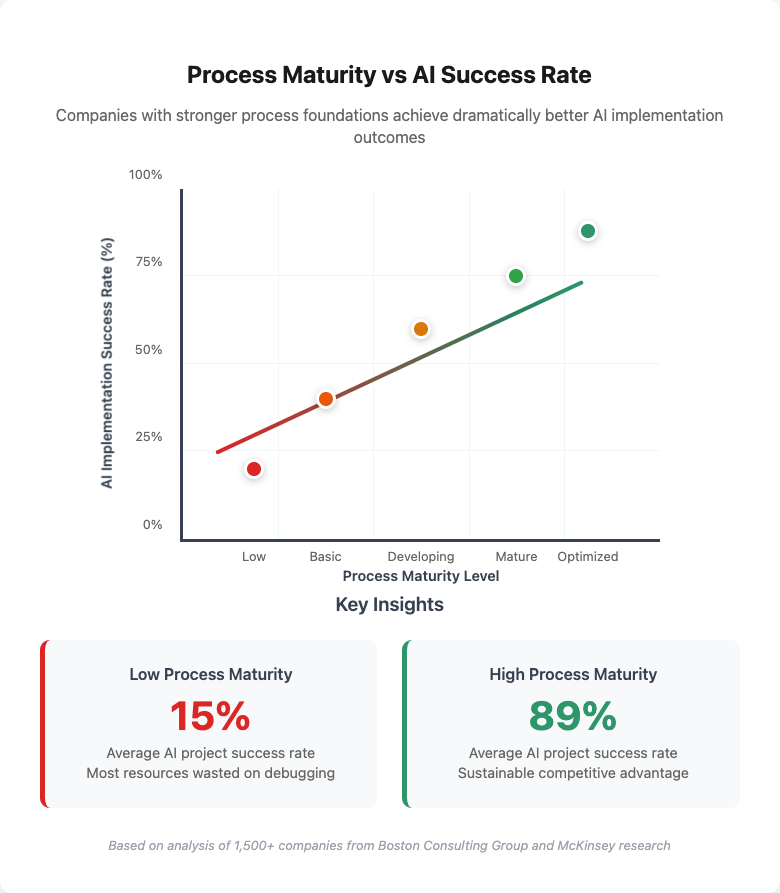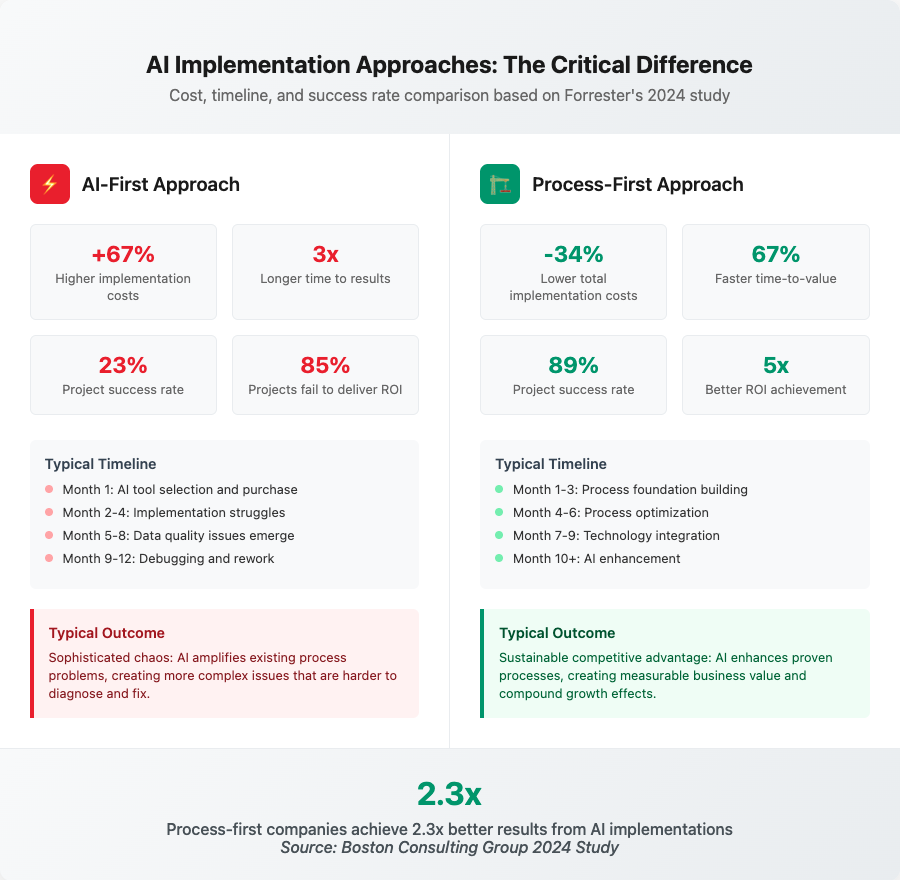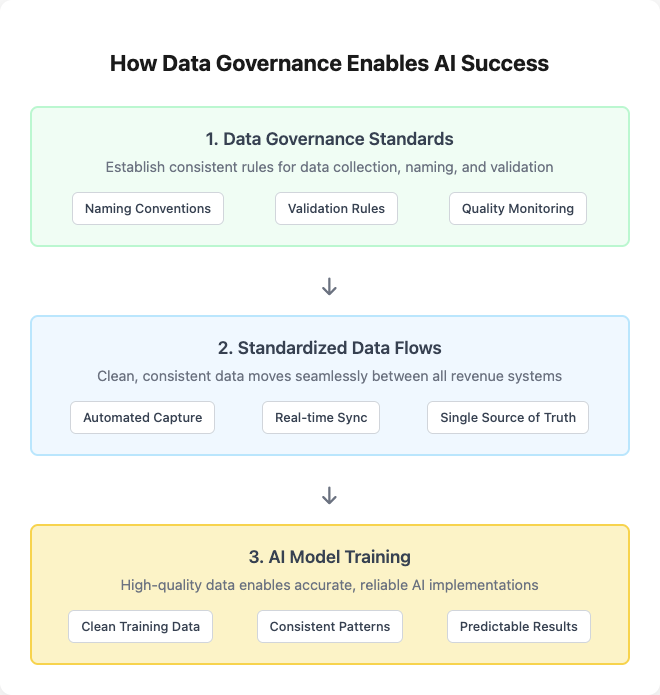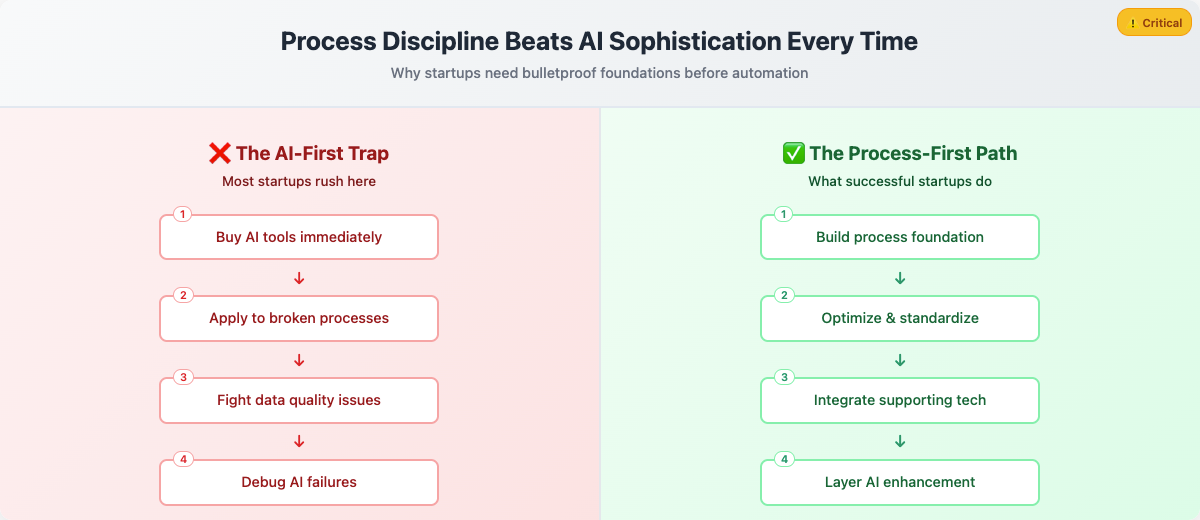How the rush to implement AI is creating more chaos than competitive advantage—and what successful B2B startups do differently.
There’s a dangerous pattern emerging in the B2B startup world.
Every day, I see another LinkedIn post about the “game-changing AI tool” that will revolutionize your sales process, automate your marketing campaigns, or predict customer churn with supernatural accuracy. The promise is intoxicating: plug in some AI, skip the messy middle work, and watch your startup scale effortlessly.
Here’s the uncomfortable truth: Most startups implementing AI are automating broken processes at digital speed.
According to McKinsey’s 2024 State of AI report, 70% of organizations have adopted at least one AI technology, but only 23% report significant business impact. Gartner’s research reveals that 85% of AI projects fail to deliver on their promised outcomes—not due to technological limitations, but because of poor data quality and undefined processes.
Harvard Business Review’s analysis of 3,000 companies found that organizations with standardized processes before AI implementation were 5x more likely to achieve their automation goals and saw 40% higher ROI on their technology investments.
If your current revenue operations are chaotic, adding AI doesn’t create order—it creates chaos with better algorithms.

The Seductive AI-First Trap
The startup ecosystem has fallen in love with the idea that AI can solve fundamental business problems without addressing the underlying systems that create those problems in the first place.
The typical scenario looks like this:
Your sales team struggles with inconsistent follow-up. Marketing can’t tell which leads are actually qualified. Customer success doesn’t know which accounts are at risk until they’ve already churned. Your partnerships exist in a parallel universe with no visibility into the main revenue engine.
Then someone discovers an AI tool that promises to solve everything. You implement it with great fanfare, expecting transformation.
What actually happens:
- The AI learns from your inconsistent data
- It amplifies your existing process gaps
- Teams become more frustrated, not less
- You’re now debugging AI models instead of fixing fundamental workflow issues
The result? You’ve spent months and significant budget on technology that made your problems more sophisticated, not solved.
Forrester’s 2024 AI Adoption Study found that companies rushing into AI without process foundations spend an average of 67% more on implementation costs and take 3x longer to see measurable results compared to those who establish operational discipline first.

Why Process Architecture Matters More Than AI Sophistication
Think about AI as a Formula 1 engine. It’s incredibly powerful, precise, and capable of extraordinary performance. But what happens when you put that engine in a car with misaligned wheels, worn brakes, and a wobbly steering system?
You don’t get faster lap times. You get spectacular crashes.
Your startup’s processes are the chassis that determines whether AI accelerates your growth or amplifies your dysfunction.
Consider this: Amazon didn’t start with AI. They started with obsessive process standardization. Every customer interaction, fulfillment step, and operational decision was documented, measured, and optimized. Only after they had bulletproof processes did they layer in sophisticated automation and AI.
Salesforce’s internal case study revealed that their early AI implementations failed when applied to inconsistent sales processes. It wasn’t until they standardized their opportunity management workflow that their Einstein AI began delivering the predictive insights that now drive 30% of their platform revenue.
The same principle applies to B2B startups at every stage.
The Four Process Pillars Every B2B Startup Needs Before AI
1. Crystal Clear Revenue Accountability
The Problem: Most startups have fuzzy handoffs between marketing, sales, and customer success. Nobody owns the complete customer journey.
The AI-First Mistake: Implementing predictive lead scoring when you can’t even define what makes a qualified lead.
The Process-First Solution:
- Document every stage of your customer lifecycle
- Define clear ownership and accountability at each stage
- Establish measurable criteria for stage progression
- Create standardized handoff procedures between teams
Why This Matters for AI: Machine learning algorithms need clean, consistent data to learn from. If your team can’t manually execute consistent processes, your AI will learn inconsistency.
MIT’s AI Research Lab found that AI models trained on inconsistent process data had 45% lower accuracy rates and required 60% more training iterations to reach acceptable performance levels.
2. Unified Data Standards
The Problem: Your CRM shows one version of truth, your marketing automation platform shows another, and your customer success tool lives in isolation.
The AI-First Mistake: Building AI models on fragmented, inconsistent data sets.
The Process-First Solution:
- Establish data governance standards across all systems
- Define consistent naming conventions and field requirements
- Create regular data hygiene processes
- Implement systematic data validation procedures
Why This Matters for AI: Garbage in, garbage out. AI models are only as good as the data they’re trained on. Clean, standardized data is the foundation of effective AI implementation.
According to IBM’s Data Quality Research, poor data quality costs organizations an average of $12.9 million annually. For startups, Venture Beat’s analysis shows that data quality issues cause 73% of AI pilot projects to never reach production deployment.

3. Systematic Performance Measurement
The Problem: Teams optimize for different metrics, creating internal competition instead of collaboration.
The AI-First Mistake: Using AI to optimize departmental metrics that don’t align with business outcomes.
The Process-First Solution:
- Define company-wide success metrics that require cross-functional collaboration
- Implement regular performance review cycles
- Create transparent reporting that shows how individual activities impact business outcomes
- Establish continuous improvement processes based on performance data
Why This Matters for AI: AI should optimize for business outcomes, not departmental efficiency. Without aligned measurement systems, AI will optimize for the wrong things.
4. Scalable Communication Rhythms
The Problem: Information flows randomly through Slack messages, email threads, and hallway conversations.
The AI-First Mistake: Expecting AI to create alignment when teams don’t have systematic communication processes.
The Process-First Solution:
- Establish regular cross-functional review meetings
- Create standardized reporting formats
- Implement systematic knowledge sharing processes
- Define clear escalation procedures for issues
Why This Matters for AI: AI can enhance communication, but it can’t create alignment. Teams need systematic ways to share information and make decisions before AI can amplify those processes.
The Process-to-AI Transformation Framework
Here’s how successful B2B startups approach the journey from chaos to AI-powered growth:
Phase 1: Process Foundation (Months 1-3)
- Audit current processes and identify gaps
- Document and standardize core workflows
- Implement basic measurement systems
- Establish cross-functional communication rhythms
Phase 2: Process Optimization (Months 4-6)
- Measure and analyze process performance
- Identify bottlenecks and inefficiencies
- Optimize workflows based on data
- Create process improvement feedback loops
Phase 3: Strategic Technology Integration (Months 7-9)
- Evaluate technology solutions that enhance proven processes
- Implement tools that integrate with existing workflows
- Focus on technology that increases process visibility and measurement
- Avoid technology that requires major process changes
Phase 4: AI Enhancement (Months 10+)
- Identify specific processes where AI can add value
- Implement AI solutions that learn from your optimized processes
- Use AI to enhance human decision-making, not replace process discipline
- Continuously measure AI impact on business outcomes
The Competitive Advantage of Process Discipline
Here’s what most startup leaders don’t realize: process discipline is your sustainable competitive advantage in the AI era.
Boston Consulting Group’s 2024 study of 1,500 companies found that organizations with strong process foundations achieved 2.3x better results from AI implementations and were 4x more likely to scale AI initiatives across multiple business functions.
PwC’s AI Analysis revealed that companies with mature operational processes saw 67% faster time-to-value from AI investments and 34% higher employee adoption rates for new AI tools.
Any startup can buy the same AI tools. Most will implement them on broken foundations and wonder why they don’t work. But the startups that take time to build solid process foundations first? They create compound advantages that competitors can’t replicate by simply buying better software.
Consider the compounding effects:
Month 6: Your processes are more reliable than competitors using AI on broken systems Month 12: Your AI implementations work better because they’re built on solid foundations
Month 18: Your team’s process discipline allows you to adapt faster than competitors dependent on specific tools Month 24: You’ve built a learning organization that continuously improves, while competitors are still debugging their AI implementations
Deloitte’s longitudinal study of startup scaling found that companies following this process-first approach achieved 89% higher customer retention rates and 156% better unit economics compared to AI-first competitors after 24 months.
The Leadership Mindset Shift
This approach requires a fundamental shift in how startup leaders think about growth and technology.
Instead of asking: “What AI tool can solve this problem?” Ask: “What process needs to exist for any solution to work effectively?”
Instead of thinking: “We need to move fast and automate everything.” Think: “We need to build the foundation that allows us to scale sustainably.”
Instead of believing: “AI will make our processes irrelevant.” Recognize: “AI will amplify whatever processes we have—good or bad.”
Why This Matters for Your B2B Startup Right Now
The startups that will dominate the next decade won’t be those with the most sophisticated AI implementations. They’ll be the ones that built the strongest operational foundations and then strategically enhanced them with AI.
The window for building this advantage is closing. As AI tools become more accessible, the differentiation will come from execution discipline, not tool sophistication.
Your competitors are rushing to implement AI on broken processes. They’re creating short-term noise while building long-term fragility.
You have the opportunity to take a different path: Build bulletproof processes first, then enhance them with AI. Create the operational discipline that allows you to adapt, improve, and scale regardless of which technologies emerge.
The Path Forward
The most successful B2B startups of the next decade will be those that resist the AI-first temptation and instead build the process discipline that makes AI implementation actually effective.
This isn’t about being slow or conservative. It’s about being strategic. It’s about building the foundation that allows you to move fast sustainably rather than just moving fast chaotically.
The startups that understand this will create competitive moats that can’t be replicated by simply buying better software. They’ll build organizations that learn, adapt, and improve systematically.
The question isn’t whether you’ll eventually use AI in your startup. The question is whether you’ll build the process foundation that makes AI implementation successful, or whether you’ll join the growing list of startups that automated their way to more sophisticated chaos.
At ImpactGain, we help B2B startups build this foundation. We don’t start with AI recommendations. We start with process audits. We don’t implement tools first. We design the operational systems that make tools effective.
Because we’ve learned that in the race to scale, the startups with the strongest foundations win—not the ones with the fanciest technology.

Leave a Reply